![]()
Sun, May 08, 2011 | The Meir Amit Intelligence and Terrorism Information Center
Iranian Media and the Royal Wedding in Britain
Iran’s media used the occasion of Prince William and Kate Middleton’s wedding, held in London last weekend, to once again slam Iran’s historic enemy and accuse Britain’s royal family of corruption and spending public funds.
While British citizens are losing their jobs and suffering from a severe economic recession, the royal couple spends over 48 million dollars of British taxpayer money on the wedding ceremonies, the conservative Fars News Agency said. The news agency reported that many British citizens are disgruntled by the high cost of the royal wedding ceremonies. Fars even claimed that the ceremonies were designed to divert British public opinion from the severe economic crisis plaguing the kingdom. The agency reported that recent public opinion polls held in Britain allegedly indicate that nearly 80 percent of British citizens place no importance on the wedding, and that at least one third of them object to the way it was covered on British media (Fars, April 27, 29).
The coverage provided by the website of Press TV, an English-language Iranian channel, and Raja News, an ultra-conservative website, also centered on the cost of the wedding. The Press TV website claimed that many people in Britain believe it is unfair to impose the exorbitant wedding expenses on British taxpayers. The website emphasized criticism from some quarters in Britain that the wedding is a waste of public funds and that its expected revenues (from tourism and souvenirs, for example) will not cover its cost (Press TV, April 29).
In addition to criticizing the spending of public funds, the media widely discussed the security measures allegedly taken by the British authorities to prevent anti-royalists from demonstrating against the wedding. Fars News Agency reported a series of arrests by the British police ahead of the wedding in which several people who planned to demonstrate against it had been detained. According to the report, the British authorities warned dozens of people who took part in last month’s labor union demonstrations not to come near downtown London during the wedding ceremonies (Fars, April 29).
The news agency also claimed that the wedding reflects the political power of Britain’s royal family. Despite claims that the Queen’s power is merely symbolic, Fars claimed, the fact is that she plays a key role in Britain’s decision-making. Such involvement is evident in her powers with regard to appointing a prime minister, disbanding the parliament, and declaring peace and war (Fars, April 27).
The issue of the wedding guests was likewise targeted by Iran’s media, particularly in light of reports saying that the Syrian ambassador’s invitation was withdrawn in protest of the suppression of the riots in Syria. Iranian media wondered how the Syrian ambassador’s invitation was withdrawn while representatives from Saudi Arabia and Bahrain remained on the guest list despite these two countries’ involvement in the brutal suppression of the riots in Bahrain.
The media interest generated by the royal wedding in Iran was itself a target for criticism from conservative circles. The Tabnak website claimed that the fact that even Iran Broadcasting discussed the wedding is proof that Britain still dominates world public opinion. While Iranian media are busy covering the high cost of the wedding, the website said, the wedding organizers greatly benefit from the fact that the wedding had coverage even from media in countries that are most hostile to Britain. The exposure allows Britain to considerably increase its financial profits from the wedding and improve the status of the British royal family, which has lost some of its prestige in recent years as a result of its involvement in several scandals (Tabnak, April 30).
Iran Broadcasting director Ezatollah Zarghami discussed the wedding as well, referring to it as “a reactionary ceremony you wouldn’t find even in Arabian Nights”. Speaking at a conference in Tehran University, Zarghami claimed that no one in Europe dared to criticize the ceremony, and the journalists who covered it were even proud of taking part in it (ISNA, May 2).
However, the criticism did not stop Iranian news websites from publishing photographs from the wedding. The numerous comments made by Iranian web surfers on the photographs indicate that the event drew a great deal of interest from the Iranian public. Furthermore, the web surfers’ comments show a completely different approach than that expressed in the Iranian media’s critical coverage.
One comment reads as follows: “The expenses for the annual mourning ceremonies [commemorating the death of Imam Hussein in Shi’ite tradition] marked in Iran are far greater [than the royal wedding expenses]”. Another web surfer said that at least the people of Britain enjoy adequate social security and are guaranteed a basic living standard. He complained about the fact that the website did not publish the many photographs showing millions of people celebrating in the streets of London.
Referring to a recent remark made by a Majles member who claimed that there was not a single dollar left in Iran’s foreign currency reserves, one web surfer said that despite the considerable wedding expenses, Britain’s foreign currency reserves are not empty. Another web surfer wondered why the Iranian media always accentuates the negative aspects of everything. While the entire world covers the wedding itself, Iran’s media focuses on the corruption of the royal family and the wedding expenses. This kind of coverage is immoral and inappropriate, the web surfer wrote in his comment.



 RSS
RSS

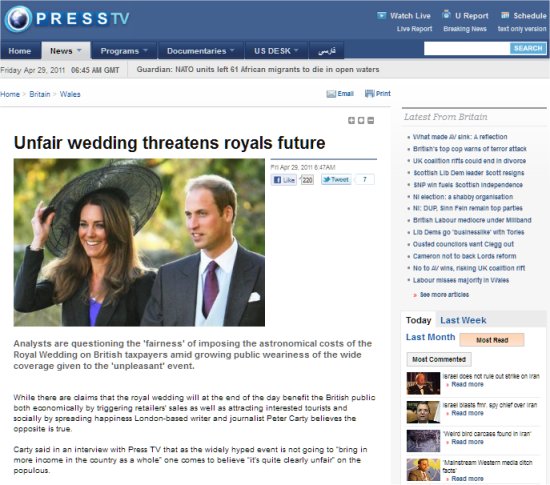
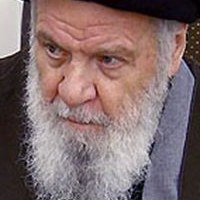
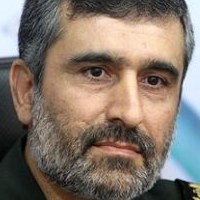
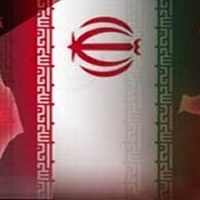
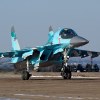





Iranian Media and the Royal Wedding in Britain | Middle East news, articles, opinion and analysis |. http://fb.me/WZ4eSxk1
RT @CrethiPlethi: Iranian Media and the Royal Wedding in Britain | Middle East news, articles, opinion and analysis |. http://fb.me/WZ4eSxk1